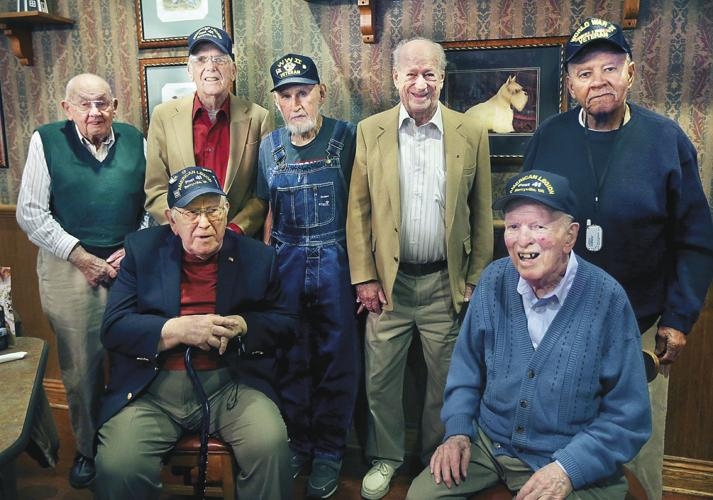
By Christopher Earley | The Winchester Star Feb. 16, 2017 WINCHESTER — While local World War II veterans Robert McDonald, 90, and Richard Byrne, 98, don’t look back upon their military service as extraordinary and certainly don’t see themselves as heroes, members of the Berryville American Legion Post 41 tend to disagree.
The longstanding local veterans organization — named in honor of U.S. Marine Corps Capt. Lloyd W. Williams, the first Clarke County man to be killed in World War I — invited seven WWII veterans to be honored at a lunch Wednesday at Perkins Restaurant in Winchester.
Clustered around several tables, the tales and good-natured ribbing were sometimes difficult to hear for the laughter coming from each man.
“I’m no hero,” said Byrne, who served as a corporal with the 11th Armored Division in famed Gen. George S. Patton’s Third Army.
“The heroes are the guys who didn’t come home.”
For the younger members of the post, including Navy veteran George Crown, 75, simply being in the presence of the WWII veterans is an incredible privilege.
“These guys are just great,” Crown said. While they still don’t talk much about the horrors of battles such as the Bulge, Normandy and the coral-blasted beaches of the South Pacific, Crown said he cherishes their many tales of hijinks and jokes about their time in uniform.
“They’re just like living history books,” Post 41’s first commander, Jon Joyce, said.
Before awarding each WWII veteran a commemorative medallion at Wednesday’s event, Post 41 commander and Vietnam veteran Robert Ferrebee, shared sobering statistics on WWII casualties, which included 41 men killed from Clarke County and 11,000 from Virginia.
“Millions of others put their lives at risk, including these men who are with us today,” Ferrebee said.
McDonald, sometimes jokingly called “Big Mac” by his Post 41 comrades, asked his father’s permission in 1944 and enlisted in the Navy at just 17 years old. Despite his never having been away from home before, he soon found himself in San Francisco to report aboard the destroyer USS Hughes (DD-410), which had been heavily damaged in the Pacific by Japanese kamikaze at the battle of Leyte Gulf several months earlier. The attack killed 18 sailors.
The sight of the battered ship he’d just been assigned to, however, didn’t make as much of a grim impression on the young McDonald as one might think.
“When you’re 17 you don’t get too scared,” McDonald chuckled. “You’re too stupid.”
McDonald boarded the USS Hughes to the Pacific, where it lobbed 5-inch shells at the Japanese coastline and eventually served on occupation duty in the country following the end of the war in August 1945.
“I never had the feeling that we did all that much. The other wars like Korea and Vietnam were just as bad as the one we were in,” McDonald said. “But it is nice to be recognized and remembered. It makes you feel very humble.”
